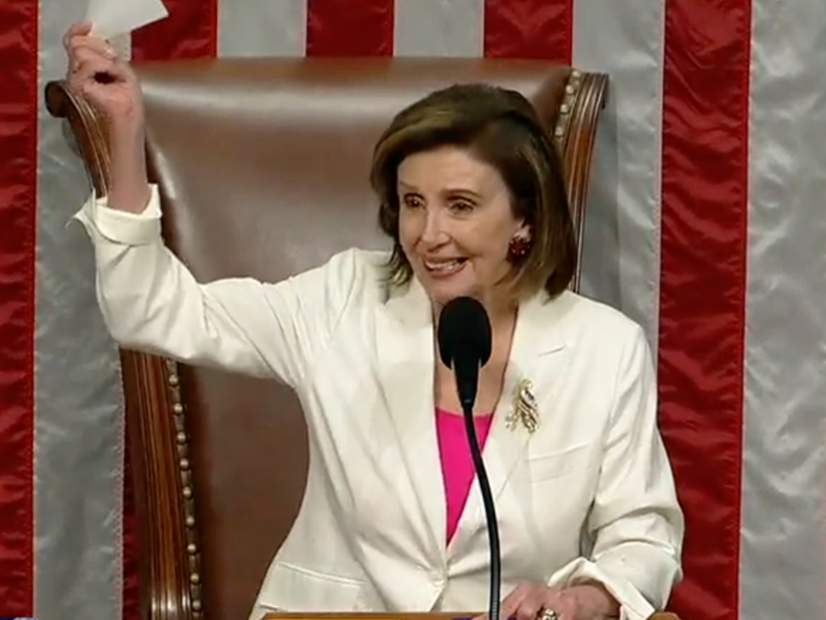
The U.S. House of Representatives on Friday passed the Build Back Better bill, the $1.75-trillion budget reconciliation package that is key to advancing President Joe Biden’s social and climate agenda.
The 220-213 vote came four days after Biden signed a bipartisan infrastructure bill and followed the release of a report from the Congressional Budget Office estimating that the bill would add $367 billion to the federal deficit from 2022-2031. One Democrat, Rep. Jared Golden of Maine, joined Republicans in opposition.
The CBO figures have been contested by the Democrats and Biden, who insisted in a statement that the bill is fiscally responsible, fully paid for and would reduce the deficit “over the long term.”
A central point of contention between the CBO and White House is how much the cost of the bill will be offset by increased taxes and more rigorous tax enforcement on wealthier Americans and corporations. The CBO estimate of $207 billion fell far short of the $400 billion figure cited by Treasury Secretary Janet Yellen in a statement released Thursday.
The bill contains $555 billion in spending to help the U.S. achieve Biden’s goals of a decarbonized electric power system by 2035 and a net-zero economy by 2050. It is in addition to about $50 billion in climate and energy related spending included in the $1.2 trillion infrastructure bill.
It would be the federal government’s largest investment ever to address climate change, dwarfing the $80 billion included in the 2009 economic stimulus enacted under former President Barack Obama.
According to a White House fact sheet, Build Back Better’s energy spending includes:
- $320 billion for 10-year federal tax credits for a range of clean energy technologies, including residential and utility-scale solar, storage, transmission and cleantech manufacturing.
- $105 billion in “resilience investments” and incentives to address extreme weather — wildfires, droughts and hurricanes — and legacy pollution in communities. The money would also fund a Civilian Climate Corps, which would employ tens of thousands of people to fight climate change through projects such as reforestation and wetland restoration.
- $110 billion in investment and incentives to support the build-out of clean energy supply chains and manufacturing.
- $20 billion for federal government procurement of “next-gen technologies,” such as long-duration storage, advanced nuclear reactors and low-carbon construction materials.
With House passage, the bill now heads to the Senate, where Sen. John Barrasso (R-Wyo.), ranking member of the Senate Committee on Energy and Natural Resources, said it will meet “a buzz saw of resistance.” In a statement released Friday, Barrasso framed the bill as an attack on Wyoming’s fossil fuel communities and families.
“Senate Republicans are united in our efforts to plunge a stake through the heart of this Democrat disaster,” he said.
With Republicans opposed to it, the bill’s fate rests with two moderate Democrats, Sen. Joe Manchin (D-W. Va.) and Sen. Krysten Sinema (D-Ariz.), both of whose votes will be needed to reach 50 and a tiebreaker by Vice President Kamala Harris.
In an interview Thursday with The Washington Post, Sinema said the House version of the reconciliation package did not match the Build Back Better framework that had been agreed with the White House in October, so further work would be needed. The House bill includes several provisions that may not survive the Senate, including a paid-leave program, an increase in the $10,000 cap on the deduction for state and local taxes and immigration provisions.
Manchin did not immediately release any statement following passage of the bill on Friday but has previously raised concerns about its potential impact on the already high rates of inflation Americans are experiencing. Last week, Manchin expressed opposition to a $4,500 federal tax credit for union-made electric vehicles, saying it was “not American.”
Robust Investments
Clean energy advocates and other energy industry trade groups quickly issued a flurry of statements on Friday supporting the bill and urging Senate passage.
Gregory Wetstone, CEO of the American Council on Renewable Energy, said the 10-year time frame for clean energy tax credits “finally moves the country beyond years of on-again, off-again renewable tax credits.”
The bill will provide “a stable, predictable and long-term clean energy tax platform that will spur critically important investment in renewable power, energy storage and advanced grid technologies. This is America’s last best chance to take timely action to address the global climate crisis, and it is imperative we rapidly accelerate the renewable energy transition,” Wetstone said.
Similarly, Jim Matheson, CEO of the National Rural Electric Cooperative Association called out provisions that will allow tax-exempt co-ops and municipal utilities to access clean energy incentives through a direct pay mechanism. The bill also includes $10 billion to help co-ops offset the costs of closing coal plants and investing in clean alternatives, he said.
Such measures are, Matheson said, “appropriate recognition of the need to level the playing field for not-for-profit cooperatives, reduce costs and open new doors for innovation.”
The bill’s support for offshore wind and building up clean energy supply chains earned praise from Liz Burdock, CEO of the Business Network for Offshore Wind.
“Fully harnessing the incredible potential offered by offshore wind requires a concentrated national industrial strategy that lays out clear clean energy goals, supports manufacturers and small businesses, builds up a workforce, and rebuilds our ports,” Burdock said. “The Build Back Better Act takes significant steps towards this strategy by providing the long-term support that will spark major investments in new factories manufacturing the blades, foundations and towers that will build the industry.”
The Carbon Capture Coalition also applauded House passage of the bill, with External Affairs Manager Madelyn Morris calling it “a package flush with robust investments in clean energy technologies.”
“If enacted, the package, in combination with the groundbreaking carbon management provisions included in the recently enacted Infrastructure Investment and Jobs Act, could deliver an estimated 13-fold increase in deployment of carbon management technologies and between 210 and 250 million metric tons of annual emissions reductions by 2035,” Morrison said.



